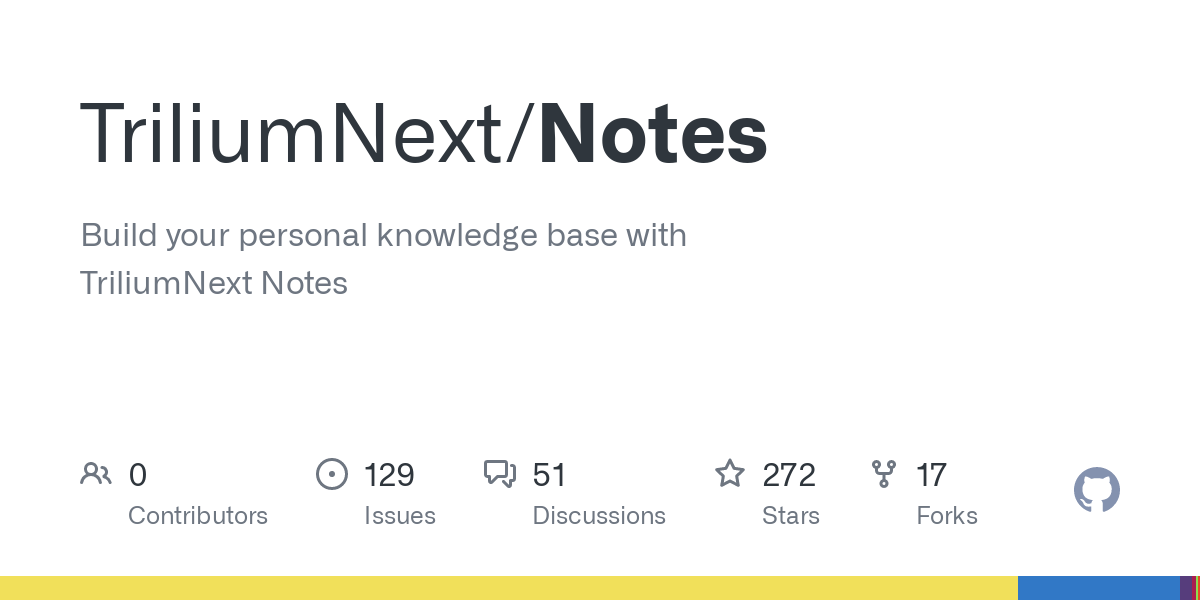TLDR: After the fantastic Trilium Notes entered maintenance mode, a significant group of community members (including myself) have committed to moving the project forward.
🎁 An official backward-compatible TriliumNext Notes release should be available soon!
If you haven’t heard of Trilium Notes (Or TriliumNext Notes), you should check it out. For an example of what TriliumNotes looks like, you can check out the slightly outdated screenshot tour. Trilium Notes is IMO the best truly open, and truly libre note taking software that exists.
Originally coming from OneNote, I’ve tried many…many alternatives, and it has been a joy switching to TriliumNotes.
🍻 This free (gratis), open-source, self-hosted, personal wiki/note software offers all the following with no nags, no paywall and no restricted features - you get all the goodies up front!
- Note cloning (notes can exist in multiple locations at once)
- Interactive note visualization maps
- Various note types (canvas, mermaid diagrams, web view, relation map, code, etc)
- Various bulk folder import and export options (HTML, Markdown, Text)
- Revision history (and recent changes view)
- Scripting (Very powerful - automate tagging, deletion, etc)
- Full documented ETAPI for external scripting or development
- Browser extension for web clipping
- Fast fuzzy search & advanced search (search by tags, parent note, size, etc)
- Sharing notes with a public url with a simple toggle
- Encrypted notes
- Extensive and versatile note tagging (inheritable tags, relationship tags, etc)
- Note note tabs, zen mode, multi-note views
- Note archiving
- Note linking and embedding (embed notes inside other notes)
- Full wysiwyg editor (with markdown and math syntax completion) - external editors supported
- Unlimited note nesting
- Daily note journaling feature
- Extendable with widgets, custom plugins, themes, scripts, etc
- Customizable keyboard shortcuts (and VIM keyboard bindings)
- Automatic note syncing to server (or other clients that are setup in ‘server’ mode)
- Automatic backups
- Cross platform (Windows, Mac, Linux, Flathub, Docker - very simple compose)
- Good documentation, Matrix support chat, Github Discussion forums, awesome lists
The main downsides are:
- The mobile (android) app currently is only for composing notes (not for reading other notes on the server). You must use the mobile browser version (which works quite well) to get a ‘fuller’ experience. (The new TriliumNext project does plan to improve the mobile experience).
- Only one user per server is currently supported (this is a high priority for the TriliumNext team)
- Some people don’t like database note taking software since they prefer files in a directory, but this isn’t an issue for me since I can automate the export of TriliumNotes (using the api) and save the notes to Nextcloud or my local file system for easy viewing.
📢 If this project interests you, you can follow the progress on github and get involved if you would like to see this project flourish! There are teams to help with development, issue triaging, documentation, testing, etc.
🗳️ If you’d like to vote on the new TriliumNext logo, you can do that too!
Happy Note Taking!)



Those two lines right there.
I value interoperability between software. Using a container format to store plaintext files and metadata introduces an XKCD 927 situation where it’s just another reinvention of the wheel that requires additional software support or a whole other workflow for no real benefit. Why is it necessary, for example, to store plaintext data and the related hierarchical structure in a container format when the same feature is already present in the filesystem with files and directories? It adds unnecessary complexity, roadblocks, and points of failure.
I’m using QOwnNotes at the moment. If I want to edit a note, for example, using neovim through SSH, all I need to do is navigate to the markdown file and open it. No scripts, no export/import. Only text files, and that is all it ever needs to be.